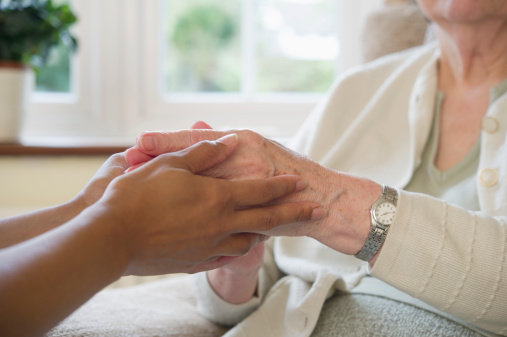
We’re not called the sandwich generation for nothing. Almost a third of U.S. adults (29 percent) act as a caregiver for an ill, elderly or disabled relative, per the National Alliance for Caregiving. Of those, roughly 66 percent are female, many of them also caring for children at home. The role can take a serious toll on your health and well-being. There’s of course the emotional strain, especially if you’re caring for a relative with dementia or another illness that requires constant monitoring. Moreover, 17 percent of caregivers in an AARP report said that their own physical health had worsened from caregiving.
“Caregiving can be very isolating, is a job most people didn’t apply for and never received proper training in and does not pay very well,” says Jerri Rosenfeld, a social worker at Northern Westchester Hospital’s Ken Hamilton Caregivers Center in Mount Kisco, N.Y. But you don’t have to go it alone. Try these resources.
Read more: Best and Worst Ways to Cope With Stress
Start with a support group
“Sometimes all you need is an opportunity to share your feelings and swap strategies in a nonjudgmental and supportive atmosphere,” Rosenfeld says. Check to see if your local hospital, church or synagogue offers resources. Or try your town’s rec center, which may have a senior or elder program that also gives caregiver support.
Read more: How to Help a Loved One Cope With Breast Cancer
Find the right online help
About 25 percent of family caregivers seek support online, whether in discussion forums or on social media channels like Facebook, according to a 2011 Caring.com survey. Look for groups that focus on just caregivers, not ones that combine patient and family. “You need to be able to be frank about your own issues, feelings and concerns without worrying about hurting someone else’s feelings,” Rosenfeld explains.
A few places to get started: Caring.com features caregiver support groups for a wide range of conditions (including Alzheimer’s, diabetes, cancer, MS and Parkinson’s) at caring.com/support-groups. AARP’s online caregiving resource center offers a space to connect to others facing issues around caregiving for the elderly; so does the caregiver support section at AgingCare.com.
Keep a journal
It’s a safe place to write out your thoughts, even if they don’t make any sense, Rosenfeld says, and research shows that journaling can help relieve stress. Try a gratitude journal, where you jot down everything that you’re grateful for; a venting diary (self-explanatory!); or a reminiscence log, where you record memories of your loved one.
Organize with an app
Apps for caregivers alleviate stress by helping you stay on top of the details. You can, for example, track appointments and medications and take notes at office visits. A good one to try: CareZone (free; iTunes and Google Play).
Read more: Hidden Stress Triggers
Steal time for you
“Often a caregiver brings in her loved one for an appointment and just sits in the waiting room, when she could be taking a quick walk outside or phoning a friend,” Rosenfeld says. Set aside time for things that nourish you; simply sipping your coffee on your patio for an extra 15 minutes can help renew your energy.
“People frequently say, ‘You need to take time for yourself so you can be a better caregiver,’ but they’ve got it completely wrong,” Rosenfeld says. “You need to take time for yourself because you’re a human being.”
Read more: Your Secret to Happiness at Every Age
Want to help a friend?
You may not be tending to aging parents yourself—but chances are you know someone who is. Instead of just saying vaguely, “Let me know if there’s anything I can do,” offer to take on specific jobs, like helping to watch her kids or bringing dinner once a week. Even better: Allow her to tell you exactly what she needs. StandWith (free; iTunes), a new app from FCancer co-founder Yael Cohen Braun, enables users to post not just updates but also tasks they need done (buying groceries, giving rides, etc.) so that folks know what will really help.
More Must-Reads from TIME
- Why Biden Dropped Out
- Ukraine’s Plan to Survive Trump
- The Rise of a New Kind of Parenting Guru
- The Chaos and Commotion of the RNC in Photos
- Why We All Have a Stake in Twisters’ Success
- 8 Eating Habits That Actually Improve Your Sleep
- Welcome to the Noah Lyles Olympics
- Get Our Paris Olympics Newsletter in Your Inbox
Contact us at letters@time.com